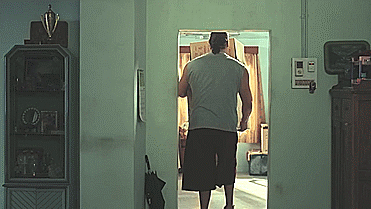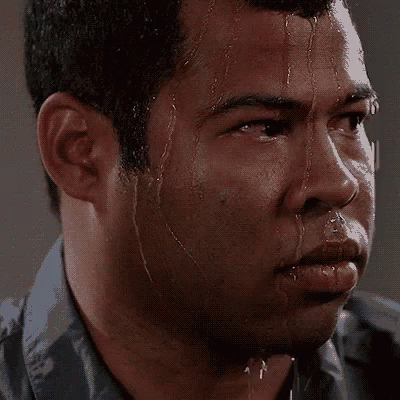More Than Meets the Eye (Don't Sweat It)
/It's hard for me to put my finger on exactly when I first started becoming self-conscious about my body.
They say that the media influences our self-perception, and I wouldn’t disagree. Looking back now on some of the TV shows I watched as a kid, I can probably pick out several characters who were portrayed negatively from a body standpoint— characters who were not in “fit” condition, so to speak. But there's not one definitive character or one definitive image that I can remember seeing in the media that told me to be self-conscious about my body. In a lot of ways, it probably just kind of happened subconsciously over time.
One of my first, and definitely most traumatic memories of feeling uncomfortable in my own body goes back to middle school. You remember middle school, everybody’s favorite and least awkward stage of their youth? I had always been one of the tallest kids in my class, but by the time I was entering middle school I had become one of the heaviest, too, and not just because of my height.
via Giphy
I had started getting heavier around the 5th grade while on medication for my OCD. On top of that, there were a lot of difficult things going on in my family at the time, so we were eating a lot of fast food. It would have been a lot for most people to deal with, no less a pre-adolescent child with a mental health disorder who was just trying to be whatever “normal” is.
Despite being heavier, I always enjoyed being active and playing sports. I had played youth league soccer and Little League baseball when I was younger. I played football during outdoor recess, but my favorite sport was basketball. Any chance I could get, I was playing sports, watching sports, or playing sports video games when it was too dark, cold, or wet to be allowed to stay outside.
In 6th grade, we had the option to join intramurals, which were held before school in the middle school gym. It was open to anybody, and we played a variety of different sports. Although I was limited athletically, I did have some athletic skill— I had a great throwing arm (I’m sure my weight allowed me to generate a little extra force behind my throws) and was very accurate shooting a basketball.
via Giphy
I was also, on the other hand, very slow and not at all in good athletic condition, so I would easily get tired and have to exert more effort to play. Needless to say, giving that extra effort and having extra weight on my body, I would get extremely overheated and by default, extremely sweaty. I had a tendency to sweat more than most of my peers, and for longer periods of time. Even after we had finished playing, after I’d changed clothes for the day and applied my deodorant, my heat-retaining body, whether I liked it or not, would continue sweating a little bit longer.
To be fair, nobody’s sweat is all that pleasant at any age or time of day. Still, I don't think I need to go into great detail for you to understand that the sweat of most 11- or 12-year-old boys going through the early stages of puberty has a certain something about it. Of course, because intramurals were in the morning, I would go through the rest of those intramural days doing my best to mask my sweat and keep myself cool, usually failing miserably at both. It didn’t matter that I had changed my clothes, put on deodorant or used baby powder. It wasn't really enough.
via Gfycat
Being around my middle school peers, this would typically make the rest of these days nothing short of a uncomfortable nightmare, a regular sacrificial ceremony for my social life. Because, as many of us can probably attest to, middle schoolers can be very, very cruel to each other…
Before middle school, I was kind of, sort of, somewhat outgoing-ish. I wasn’t the center of attention by any means, and I’m sure I was still self-conscious about certain things, but I would still put myself out there, sort of. Then, middle school happened. With each day of merciless ridicule I became a shell of myself, introverted and withdrawn to the point where if I could’ve become invisible, I would have— not because invisibility would’ve been a cool superhero power, but because no attention at all, in my mind, was better than the barrage of negative attention I was getting at the time.
It took me a long, long, long time before I felt comfortable putting myself out there again. The end of high school was a better time for me, and college gave me a fresh start socially. Mentally, though, I still can’t say that I’ve fully recovered, or that I ever will.
I can still hear the whispers, the snickering, the laughing and the mocking chants from down those hallways.
I can still remember trying to sit perfectly still at my desk so as to trick my body into cooling down, only to find that it only made more more tense and did not at all help me stop sweating.
via Tenor
I still feel the need to have an extra change of clothes (or three) accessible to me at social gatherings, and go to great lengths to avoid situations where I’ll be sweaty for extended periods of time around other people.
And, I still not only remember, but at times feel that cringeworthy, crawling-in-my-skin, get-me-out-of-here feeling whenever I sweat in public, a wounded feeling just as fresh as the first time I was made fun of for sweating.
If you’re like me and tend to sweat more than you’d like to at times when you’d rather not sweat, I truly feel for you. I understand what it’s like to be stuck in a crowd of people, also stuck in your own head thinking about how much you’re sweating and who’s going to notice. I get the feeling of walking into a public restroom hoping to run cold water over your arms to cool yourself down, only for your body to turn it into a salty vapor, leaving you looking even sweatier than you were to begin with and wishing you had a freezer to stick your head into.
via Tenor
But remember, just like our own body image is more than what meets the eye, so are you.
It’s easy to think of body image as the way we look— after all, “image” does lend itself to the visual interpretation of things. But make no mistake about it, body image is so much more than that. It’s the way we appear, physically, when we see ourselves, but just as importantly, it’s the way we feel about our bodies and the way our bodies can make us feel in our minds. Our body image responds to the words of others even when it knows it shouldn’t. It requires kindness and the utmost care, kindness that so many of us are so often reluctant to show ourselves and a level of care that only you, and very few others might give it.
Lastly, with that care comes the allowance of some leniency. The understanding that, hey, people sweat. Does that mean we shouldn’t go out in public on a hot day, or enjoy some physical activity? Of course not. Does it mean that you might need to carry an extra set of clothes with you? Sure. There’s nothing wrong with that, and don’t let anybody tell you otherwise. Even if you can’t avoid it literally, figuratively, don’t sweat it.
Honestly, if someone would be so bothered by your sweat that they’d have something to say about it, then it really shouldn’t matter if you’ve gone so far as to take into consideration bringing a change of clothes anyway. They can’t have it both ways. It’s nobody’s business what you need to do to keep yourself feeling comfortable in your own skin. Do what you have to do to manage your sweat, feel comfortable, and to take care of your body image, both mentally and physically.
Besides the way you look, what else impacts the way you feel about your body?
Share your comments at the bottom of the page.
Whatismyhealth © 2018






